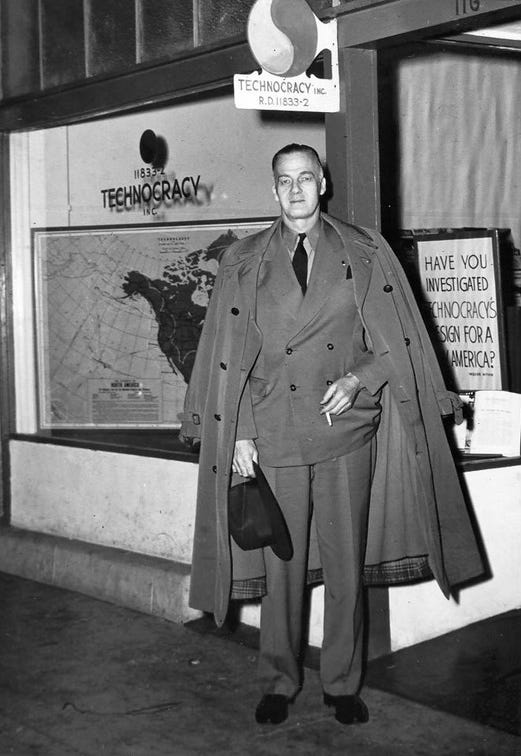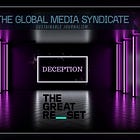What They Really Mean by “Globalisation Is Over”
A Knight, A Quote, and the End of Globalization: Welcome to the Closed System.
What They Really Mean by “Globalisation is Over”
The era of globalization was the delivery mechanism. The era of Technocracy is the destination.
And we’re already inside it.
When Kier Starmer, a knighted British politician and Trilateral Commission member, announces the “end of globalization” and a “new era,” it’s not accidental that this declaration comes from London — the symbolic and historical seat of The Crown.
At the top of this structure, though rarely acknowledged, are three sovereign city-states that still call the shots: The City of London (financial power), the Vatican (religious and ideological power), and Washington D.C. (military enforcement). These entities operate independently from the nations they appear to be part of and serve as autonomous engines of global control, what many researchers call “The Empire of the City.”
When Kier Starmer made this statement, he wasn’t lamenting the end of free-market capitalism. He was signaling the activation of a long-engineered transition from open globalism to a closed, controlled Technocratic system.
This isn't conspiracy theory. It's history. And it’s unfolding in real time.
When Kier Starmer says,
“Globalisation is over. We are now in a new era,”
He is not mourning the end of the neoliberal free trade model. He is announcing its planned obsolescence — a shift from open-market capitalism (which gave the illusion of freedom and competition) to a closed-loop, centrally managed Technocratic system.
This “new era” is:
Not about nations competing freely.
Not about individual autonomy.
It’s about managing scarcity, redistributing energy, and engineering behavior under AI-enhanced surveillance — all under the language of climate justice, digital equity, and sustainability.
What Is a Closed System?
In Technocratic terms, a closed system is:
A society with no true free markets, only managed consumption.
Energy, movement, production, and access are metered, not earned or freely negotiated.
It operates on inputs and outputs, not human will or moral law.
There’s no escape hatch — only compliance, submission, or exclusion.
Technocracy seeks to create a fully enclosed, data-driven control loop, where every individual is a sensor and every action becomes an algorithmic trigger. — paraphrased from Patrick Wood, Technocracy Rising
In contrast:
Open systems allow for unpredicted innovation, dissent, and disruption.
Closed systems assume perfect knowledge, centralized authority, and full predictive control of populations — the fantasy of the Technocrat.
What Is a Closed-Loop Society?
A closed-loop society is a post-market, post-liberty system where:
Behavior is monitored and managed by AI and biometric surveillance.
Movement, consumption, education, and energy use are metered and rationed.
Dissent is preemptively neutralized through social scoring, cancel culture, and psychological framing.
Spirituality is redefined under ecumenical, UN-aligned constructs like the Inner Development Goals.
There are no external escape valves, no sovereign alternatives — only managed participation under programmable, centralized systems. What began as “globalization” was merely the delivery mechanism.
When the Trilateral Commission was founded in 1973 by David Rockefeller and Zbigniew Brzezinski, their stated aim was a "New International Economic Order." But unlike previous economic ideologies (capitalism, socialism, communism), what they were really gesturing toward was Technocracy — a system not built by politicians or philosophers, but engineers and scientists who wanted to design society around data, energy usage, and surveillance-based management.
Technocracy originated in the 1930s at Columbia University, (see more below) where its advocates (like Howard Scott and M. King Hubbert) envisioned a post-monetary, post-democratic world. They proposed that energy consumption (measured in ergs or joules) would replace money as the primary accounting system — a model that eerily mirrors today’s carbon credits, digital currencies, and ESG scoring.
Now, when you quote a 2023 declaration from the Trilateral Commission that it’s “year one” of their New International Economic Order — that’s not just a symbolic reboot. It’s them signaling that the long-planned shift toward a controlled, post-capitalist, technocratic system is here.
And Kier Starmer (now deeply enmeshed in Trilateral and WEF ideology) saying, “globalisation is over” is key. Globalization was always a phase — a transition tool. Now that populations are sufficiently digitized, monitored, and demoralized, the plan moves into Technocracy 2.0:
De-industrialization in the West (i.e., Club of Rome’s "Degrowth")
Controlled AI labor systems
Carbon rationing disguised as "climate justice"
Digital identity + programmable currency
Social behavior nudging through “data-driven governance”
The Trilateral Commission was always the policy driver behind this, influencing the G30, IMF, World Bank, UN, and now AI governance frameworks.
🧠 Technocracy to Total Control: A Timeline of the Engineered New World Order
1930s: The Birth of Technocracy
1932: At Columbia University, engineers like Howard Scott and M. King Hubbert propose Technocracy — a new economic system not based on money, but on energy accounting.
They envision a society where all resources and people are managed scientifically.
Humans become data nodes; behavior is engineered; politics is obsolete.
Decisions are centralized, not debated.
See: Howard Scott and M. King Hubbert, Technocracy Study Course, Technocracy Inc., 1934.
(See more on Columbia’s central role shaping post-Christian, post-Western civilization at the end of the article)
1940s–60s: Technocracy Paused, Not Forgotten
WWII and post-war consumer booms slow Technocracy’s advance.
But its ideological DNA spreads into systems theory, cybernetics, early computing and social planning.
1973: The Trilateral Commission Resurrects the Plan
David Rockefeller and Zbigniew Brzezinski launch the Trilateral Commission (TC) to coordinate elite policy and manage policy between North America, Europe, and Japan.
Brzezinski, in his 1970 book Between Two Ages, calls for a “technetronic era” — a future society controlled by elites through surveillance, digital control, and psychological manipulation.
The TC’s mission: implement a "New International Economic Order.”
Behind the curtain: a revived Technocratic model — minus the unpopular branding.
Zbigniew Brzezinski, Between Two Ages: America’s Role in the Technetronic Era (New York: Viking Press, 1970).
1992: Agenda 21 — Technocracy Goes Green
At the Earth Summit in Rio, the UN launches Agenda 21, recasting Technocracy as "sustainable development."
Resources, rights, and freedoms are subordinated to climate metrics.
Sovereignty dissolves; central planning expands. Sovereignty is replaced by multi-stakeholder governance.
United Nations, Agenda 21: Programme of Action for Sustainable Development (New York: United Nations Publications, 1993).
2000s: Global Systems Integration
UN, WEF, IMF, and World Bank begin coordinating metrics-based governance:
Education becomes standardized and data-driven (Common Core, SEL).
Corporations adopt triple bottom line metrics (People, Planet, Profit).
Tech firms digitize every aspect of life. Tech firms begin to map human behavior digitally.
Klaus Schwab and Thierry Malleret, COVID-19: The Great Reset (Geneva: World Economic Forum, 2020).
2015: UN Launches Agenda 2030 and the SDGs
The Sustainable Development Goals (SDGs) operationalize Technocracy globally.
17 goals with 169 targets become the blueprint for global governance.
Paired with ESG scoring, these goals tie compliance to capital and influence.
Governments and corporations merge into multi-stakeholder governance.
United Nations, Transforming Our World: The 2030 Agenda for Sustainable Development (New York: United Nations, 2015).
2018–2020: SEL, DEI, ESG, and AI Governance
Social Emotional Learning (SEL) and Diversity, Equity, Inclusion (DEI) enter education and HR departments to reshape human behavior, plus- normalize psychological conditioning and identity-based behavior management in schools and workplaces.
These are not about compassion — they are tools for engineering social conformity via control.
AI panels (with UN and WEF backing) begin designing the rules for programmable currency, biometric IDs, and predictive policy enforcement.
Joe L. Kincheloe, Knowledge and Critical Pedagogy: An Introduction (Rotterdam: Sense Publishers, 2008).
2020: COVID Accelerates Technocracy
Under the pretext of a health emergency, populations are locked down, digitally tracked, and conditioned to accept:
Central Bank Digital Currencies (CBDCs)
Health passports
AI-assisted “misinformation” governance, censorship
Remote learning, remote work, and remote medicine — all managed by data.
Lockdowns normalize mass compliance, digital tracking, and remote living.
"Public-private partnerships" become default.
Schwab and Malleret, COVID-19: The Great Reset.
2023: Trilateral Commission Declares “Year One”
TC publicly announces 2023 as the launch point for the New International Economic Order.
This isn’t a reboot of capitalism. It’s a closed-loop Technocracy 2.0
This is not a reboot of globalization. It’s the launch of Technocracy 2.0:
Post-cash economy (CBDCs)
Post-democracy governance (AI + stakeholder councils)
Post-truth epistemology (repressive tolerance + cancel culture)
No free markets
No dissent
No escape
Trilateral Commission, “Year One Statement,” cited in reports by Nikkei Asia, March 2023.
2024–2025: Technocratic Governance Codified
Politicians like Kier Starmer (UK Labour leader and TC member) say:
“Globalisation is over. We are now in a new era.”
This marks the transition from open-market globalism to closed-system Technocracy.
Starmer and others are administrators, not leaders — they serve the global managerial class.
AI governance, carbon tracking, degrowth economics, and psychological metrics become default tools of control.
🔍 A Counterfeit Kingdom
Technocracy is not just an economic alternative. It is a counterfeit kingdom — one that mimics divine omniscience through AI, replaces divine judgment with carbon scores, and divine providence through universal basic income.
But the counterfeit is also personal. Ultimately, an ultra rational ordering of society, Technocracy is a manifestation of dark a partnership between mankind’s desire for autonomy, just as the Babelites sought to make God irrelevant, and Satan’s sole purpose of destroying God’s image bearers by using that desire against them.
Under the illusion of equity and sustainability, the people are reduced to “human capital” while obedience is managed through behavioral data and compliance incentives. The real illusion is autonomy. There is nothing autonomous in all creation but the Lordship of Jesus Christ and whenever the god of this world is involved, it’s always personal.
Where Trump’s Tariffs Fit In
Trump’s nationalist trade policies disrupted the globalist timeline, but not the final destination:
He exited TPP, imposed tariffs, and challenged climate agendas.
But AI systems, vaccine passports, and digital ID infrastructure advanced under the surface.
The tariffs were a speed bump, not a roadblock.
QUOTES from the Ideologues of the New Era
Zbigniew Brzezinski — Trilateral Commission co-founder, Technocratic strategist
“The technetronic era involves the gradual appearance of a more controlled society... dominated by an elite, unrestrained by traditional values.”
(Between Two Ages, 1970)“Soon it will be possible to assert almost continuous surveillance over every citizen... and maintain up-to-date complete files.”
(Between Two Ages)
Interpretation: Brzezinski’s “technetronic era” is the spiritual predecessor to AI-powered surveillance capitalism and ESG scoring. Starmer’s “new era” is simply that world made real.
Klaus Schwab — Founder, World Economic Forum
“You’ll own nothing, and be happy.”
(WEF prediction, Agenda 2030)“The Fourth Industrial Revolution does not change what we are doing, it changes who we are.”
(The Fourth Industrial Revolution, 2016)
Interpretation: Schwab frames transhumanism and behavioral engineering as progress. This is Technocracy repackaged — not political liberation, but data-driven re-education.
Joe L. Kincheloe — Critical Constructivism architect
“Constructivism means understanding that all knowledge is constructed in a context... Critical constructivists are not seeking truth, but transformation.”
(Knowledge and Critical Pedagogy, 2008)
Interpretation: Kincheloe’s theory — infused into SEL, DEI, and woke education — underpins perception engineering. Objective truth is discarded; behavior and belief are remodeled for social cohesion in a technocratic world.
Alice Bailey — Theosophist and UN spiritual influencer
“The coming world order... will be founded on the recognition of divine intelligent purpose.”
(The Externalisation of the Hierarchy, 1957)“Certain nations will be the custodians of particular aspects of the coming civilization... This will be largely the work of the New Group of World Servers.”
(Problems of Humanity, 1944)
Interpretation: Bailey envisions a Luciferian “Age of Aquarius” led by spiritually enlightened bureaucrats. Her writings deeply influenced the UN's Agenda 21, SDGs, and Inner Development Goals — Technocracy with a mystical halo.
What Alice Bailey described as the “re-emergence of the Hierarchy” by 2025, a global spiritual authority guiding humanity toward unity, evolution, and cosmic consciousness could absolutely manifest today in the form of Artificial Intelligence. And it wouldn't even need to claim supernatural origin. In fact, its power lies in its plausibility: AI will be accepted by both the secular world and the spiritually deceived as the “wisdom” we need to save ourselves. continue reading
From Brzezinski to Starmer
Kier Starmer didn’t invent this "new era." He is merely a steward of the Trilateral script:
Brzezinski envisioned it
Schwab packaged it
Kincheloe educated for it
Bailey spiritualized it
Kier Starmer’s phrase is elite signaling that the game has changed. “Globalization” was the vehicle. The destination is Technocracy — a post-market, post-nation, post-human system governed by:
Digital IDs
AI compliance scoring
Energy-based economics
Engineered consent
Post-truth epistemology
The era of globalization was the delivery mechanism. The era of Technocracy is the destination.
And we’re already inside it.
Starmer didn’t invent this new era. He is a technocratic steward, advancing the decades-old roadmap laid by Brzezinski, dressed in the AI suit tailored by Schwab, taught in classrooms by Kincheloe, and anointed with the occult spiritual vision of Bailey.
This “new era” isn’t new at all. It’s the final form of man’s rebellion against God: a counterfeit kingdom of total control, powered by surveillance, AI, and spiritual deception. But we are not left without instruction.
The Church must:
Preach Christ, not compliance
Gospel the AI — not run from it
Expose the counterfeit with truth, not ideology
Refuse to bow to the data gods of ESG, SEL, and digital “ethics”
Evangelical Christians have been taken by surprise at the tremendous shift that has come in the previous generations. Autonomous humanism, autonomous science, autonomous philosophy, and autonomous government gained momentum, and as the West turned away from its roots there came a flood. A deluge of mechanistic control overwhelmed grace. Exchanging the sufficiency of divine revelation for an insufficient bloated anthropology, grace, freedom, and eventually man will be consumed within the autonomous structure. As Francis Schaeffer said,
“You can hang on to freedom for a while, desperately using the word freedom like Rousseau and his (enlightened) followers, but… once the rationalistic possibilities are exhausted… freedom becomes non-freedom.” (Escape From Reason. pp. 52, 53)
This is not the time to conform. It’s time to stand firm, knowing the true King has already overcome the world, and no technocrat, no algorithm, and no empire can dethrone Him.
“Blessed is the man who walks not in the counsel of the wicked…” — Psalm 1:1
Thank you for reading.
Grace and peace.
Soli Deo Gloria.
Summer Black, Director, Armor of Truth
EXTRA
Re: Columbia University
Columbia University and the Closed-Loop Society of Technocracy
Columbia University is far more than just an Ivy League school. It functions as a core ideological engine of the New World Order, embedding globalist, technocratic, and revolutionary narratives into every major sphere: economics, education, media, geopolitics, AI, and even esoteric philosophy.
Here’s a breakdown of how Columbia University props up the global Technocratic system — and its historical links to The Crown and the Commonwealth elite:
Columbia University’s Role in the New World Order
Technocracy’s Incubator (1930s)
Columbia was the birthplace of the Technocracy movement under Howard Scott and M. King Hubbert in 1932.
Proposed a post-monetary system run by engineers using energy as currency — a blueprint for ESG, carbon credits, and CBDCs.
The Technocratic model was overtly anti-democratic and anti-capitalist, focused on total data-based control.
Center of Western Marxism & Critical Theory
Herbert Marcuse influenced many at Columbia, blending Freudian psychoanalysis with Marxist social critique.
Columbia housed the Frankfurt School émigrés in exile, who later reshaped U.S. academia and media from within.
Led to the emergence of Critical Theory, Critical Race Theory, and modern DEI/SEL frameworks — psychological tools of Technocratic governance.
Edward Said and the Weaponization of Identity
Columbia professor Edward Said authored Orientalism (1978), which launched the academic branch of postcolonial theory.
Framed the West as inherently oppressive — enabling permanent guilt narratives, reparations ideology, and civilizational deconstruction.
This intellectual lineage now drives SDG-aligned grievance movements across the Global South and within Western nations.
AI Ethics, Surveillance, and Behaviorism
Columbia is deeply involved in AI ethics panels, predictive policing research, and social impact technology.
Works with Google, IBM, and UN agencies to structure frameworks that govern AI-human interaction — the digital spine of Technocracy.
They help define “algorithmic justice” — a euphemism for behavior-modification and conformity scoring.
Columbia Mailman School of Public Health
Influential in shaping global pandemic policy, vaccine compliance models, and “resilience” planning.
Tied to Rockefeller Foundation, WHO, and WEF health advisory councils.
Promotes global bio-governance — nudging populations toward permanent health surveillance.
Strong British Commonwealth Links
Columbia’s founding donors, trustees, and architecture:
Cecil Rhodes’ Round Table Group heavily influenced U.S. institutions through the Council on Foreign Relations (CFR), which was co-founded with Columbia faculty.
Columbia has longstanding ties to the Rhodes Trust, Commonwealth education forums, and British Royal Society-aligned scientific communities.
Rhodes’ vision of uniting nations under global governance is echoed in Columbia’s institutional priorities: global citizenship, climate equity, and technocratic governance.
Columbia Journalism School — Media Gatekeeper
Trains global media elites — shaping how climate change, AI, race, and geopolitics are reported.
Home of the Pulitzer Prizes, which reward conformity to establishment narratives.
Partners with global outlets to export soft-woke, elite-approved narratives worldwide — a media arm of global governance.
Columbia’s Role in the Empire
Columbia functions as a multi-dimensional pillar of the Empire of the City:
London (The Crown): Funds, coordinates, and ideologically aligns.
Washington, D.C.: Implements the policies Columbia designs (via CFR, World Bank, etc.).
The Vatican: Embraces many of the same “human dignity” talking points repackaged as universalist spiritual values — often grounded in ideas birthed at Columbia.
In short, Columbia is the ideological forge for post-Western civilization, crafting the narratives, metrics, and mechanisms needed to usher in the Technocratic new world order — cloaked in academia, ethics, and progress.
Though Columbia University was rebranded from King’s College in 1784 to mark America’s break from monarchy, its deep historical ties to The Crown, including a founding charter from King George II suggest the transformation was more symbolic than structural. Far from severing allegiance to global elite networks, Columbia evolved into a central node in the Hidden Hand agenda: closely linked to the vision of Cecil Rhodes, the rise of Technocracy, and the UN’s global governance infrastructure.
Columbia University has played a central role in building the ideological and operational scaffolding for what is now a full-spectrum Technocratic system. As mentioned earlier, in as early as 1932, it was the birthplace of the Technocracy movement, where engineers like Howard Scott and M. King Hubbert proposed replacing free markets and representative governance with energy-based accounting and scientific management of all resources and human activity (Scott and Hubbert, Technocracy Study Course, 1934).
Mahmoud Khalil’s involvement in UN-affiliated organizations like UNRWA and his active role in global human rights advocacy place him firmly within the orbit of globalist institutions. Noted at Columbia University, Khalil exemplifies the transnational activist class—individuals shaped by elite narratives to advance post-national governance, identity politics, and SDG-aligned compliance, all under the banner of humanitarianism.
Right now Columbia is deeply embedded in AI ethics governance, climate surveillance, public health compliance systems, and UN-aligned digital rights initiatives, all under the guise of “equity” and “planetary wellbeing.” Through its schools of journalism, public health, and law, Columbia continues to produce the architects of cultural engineering, soft-woke governance, and global psychological conditioning, key tools for replacing liberty with algorithmic compliance.
Far from being a neutral institution, Columbia is the cerebral hub of the New World Order, advancing the same closed-loop control system envisioned by its early Technocrats — a system openly hostile to free societies, national sovereignty, and biblical truth.
The destination was always Technocracy and Columbia has quietly served as its academic throne.
Columbia Citations
Howard Scott and M. King Hubbert, Technocracy Study Course (New York: Technocracy Inc., 1934).
Martin Jay, The Dialectical Imagination: A History of the Frankfurt School and the Institute of Social Research(Berkeley: University of California Press, 1973).
Edward Said, Orientalism (New York: Pantheon Books, 1978).
Klaus Schwab and Thierry Malleret, COVID-19: The Great Reset (Geneva: World Economic Forum, 2020).
Patrick Wood, Technocracy Rising: The Trojan Horse of Global Transformation (Mesa, AZ: Coherent Publishing, 2015).
technocracy, globalism collapse, New International Economic Order, Kier Starmer Trilateral, The Crown technocracy, Empire of the City, digital control system, ESG, SEL, AI ethics, Alice Bailey, Klaus Schwab, Zbigniew Brzezinski, Christian response technocracy, biblical worldview, surveillance state, Fourth Industrial Revolution, spiritual deception, global governance, closed-loop system, UN Agenda 2030, technocratic age
Article Sources
Scott, Howard, and M. King Hubbert. Technocracy Study Course. New York: Technocracy Inc., 1934.
Brzezinski, Zbigniew. Between Two Ages: America's Role in the Technetronic Era. New York: Viking Press, 1970.
United Nations. Agenda 21: Programme of Action for Sustainable Development. New York: United Nations Publications, 1993.
United Nations. Transforming Our World: The 2030 Agenda for Sustainable Development. New York: United Nations, 2015.
Schwab, Klaus, and Thierry Malleret. COVID-19: The Great Reset. Geneva: World Economic Forum, 2020.
Schwab, Klaus. The Fourth Industrial Revolution. Geneva: World Economic Forum, 2016.
Kincheloe, Joe L. Knowledge and Critical Pedagogy: An Introduction. Rotterdam: Sense Publishers, 2008.
Bailey, Alice A. The Externalisation of the Hierarchy. New York: Lucis Publishing Company, 1957.
Bailey, Alice A. Problems of Humanity. New York: Lucis Publishing Company, 1944.
Schaeffer, Francis A. Escape from Reason. Downers Grove, IL: InterVarsity Press, 1968.
Nikkei Asia. “Trilateral Commission Declares 2023 ‘Year One’ of New Global Order.” March 2023. [Refer to archived report or independent citation.]
About Armor of Truth: https://armoroftruth.substack.com/about
Download the Armor of Truth Mobile App Free
NEW! AoT Locals
NEW! AoT Telegram
Join our AoT Newsletter email list
Armor of Truth, Inc is a 501(c)(3) Non Profit Organization
Donations are tax deductible
By supporting Armor of Truth you are helping to reach thousands of people daily with the Gospel of Jesus Christ and encouragement to persevere in a world that is hostile to the gospel. Please consider making a donation to help support this mission.
Support Armor of Truth Donate


















